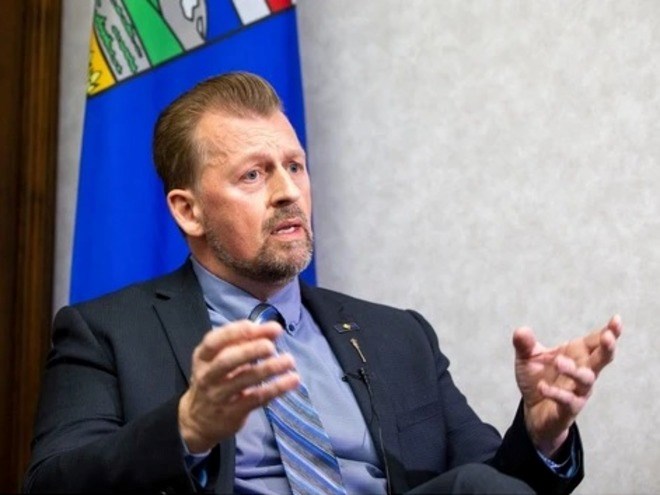
Thursday January 19, 2023
By Bill Kaufmann
Activists, physicians and immigration lawyers have denounced the detention policy, saying it violates the the most vulnerable's human rights

Mike Ellis Associate Minister of Mental Health and Addictions in Alberta. Taken on Tuesday, Feb. 22, 2022 in Edmonton. PHOTO BY GREG SOUTHAM /Postmedia
In another friction point with Ottawa, the province is ending a 17-year agreement and will stop holding the federal government’s immigration detainees.
In a tersely worded statement Wednesday, Public Safety and Emergency Services Minister Mike Ellis urged other provinces to join Alberta in refusing to assist the federal government in detaining newcomers, calling the policy unjust.
“Immigration legislation is the federal government’s responsibility — and the care and custody of people detained on immigration matters should be as well,” stated Ellis.
“People who come to Canada for a fresh start and a new life deserve a better welcome than a jail cell while paperwork is sorted out. That is why we are also calling on all provinces to join us in ending this practice.”
Following a 2006 pact with Ottawa, Alberta agreed to hold immigration detainees in provincial correctional centres, but Ellis’s office said the UCP government served notice in 2020 that it would end the arrangement on March 31, 2021.
But just days before the agreement expired, the federal government requested an extension, which the province granted until March 31 of this year.
Last Dec. 22, the province said it finalized a date of June 31, 2023, for Ottawa to find alternate arrangements to house Canada Border Services Agency (CBSA) detainees.
Between April 1 and Oct. 31 of 2022, the province says it held an average of 15 detainees daily in its facilities — a number that’s been slightly higher in recent years.
The CBSA says its reasons for detention are based on the possibility newcomers have criminal convictions, links to organized crime or human trafficking, failure to comply with regulations, have no ties to the community, pose a risk to the public or questions over identity.
It said from April through June of last year, 276 — or 19 per cent — of detainees were held at provincial facilities, and the average length of detention was 12.6 days.
During that time, 63 people under the policy were detained in Alberta in provincial custody, the fourth most in the country.
Activists, physicians, immigration lawyers have denounced policy as violation of human rights
Alberta is not the first province to seek an end to the detention agreement. Last July, B.C.’s NDP government gave CBSA one year to dissolve the pact, with human rights activists saying they hoped the move would influence other provinces.
Last fall, Manitoba and Nova Scotia followed suit.
Activists, physicians and immigration lawyers have denounced the detention policy, saying it violates the most vulnerable’s human rights.
“Conditions at the (Calgary) Remand Centre are a very blunt instrument for the vagaries of immigrant situations,” said Raj Sharma, a Calgary immigration lawyer.
“A typical detainee profile is someone who’s made a refugee claim who, for whatever reason, doesn’t have his documents in order or who the CBSA thinks might be a flight risk.”
Sharma said he represented one pregnant Somali woman who had to be transported to hospital seven times during her detention in Calgary.
There are only three federally operated immigrant holding centres in Canada — in B.C., Ontario and Quebec — with Ottawa relying on provincial lockups in other provinces, said Julia Sande, a lawyer with Amnesty International.
“People in them are held solely on administrative grounds — they’ve done nothing wrong yet they’re subject to the same extreme confines — solitary confinement, sometimes in shackles and can be held indefinitely,” said Sande.
“These are deeply stressful situations with people not knowing why they’re there or when they’ll be released.”
She noted there have been investigations into several deaths of immigrant detainees in recent years.
Both Sharma and Sande said they hope the provinces taking a stand against the practice will push Ottawa to end it.
Sande said there are already community programs that deal more compassionately with immigrants, many of whom have escaped traumatic experiences to come to Canada.
“There’s really no need to hold people in detention,” she said.
In recent months, the Alberta government has rebelled against Ottawa’s gun control measures, particularly its plan to buy back what it considers assault-style firearms.
The governing UCP has passed into law Bill 1, or the Alberta Sovereignty Within a United Canada Act, which promises to ignore federal policies or laws that harm the province’s interests.
Premier Danielle Smith has also taken aim at Ottawa’s Just Transition proposal, calling the policy — which aims to retrain those displaced by a changing economy and a possible greenhouse gas emissions cap — an attack on Alberta’s energy industry.